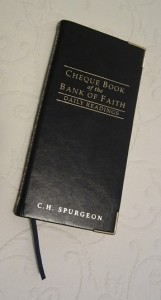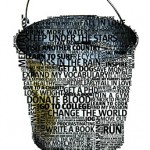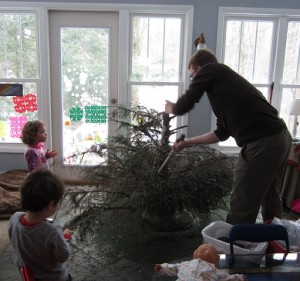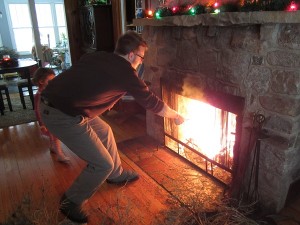This morning my Spurgeon reading included a note about Nate and his experience. The reading began with a familiar verse from Matthew:
“Come unto me, all ye that labor and are heavy laden, and I will give you rest.” (11:28)
I read Spurgeon’s commentary and then glanced at the notes in the margins, written in past years. A penned note said, “Nate [at the cottage] soul-searching, 1/14, 1/15, 1/16, 2005.”
I remember that weekend well. He was up to his nose in frustrations and had dropped to a low place emotionally. When he suggested he take a day or two away to think and pray, I heartily agreed and happily volunteered to handle the home front in his absence.
We both decided to fast throughout those 3 days, hoping God would somehow apply food sacrifices to our prayers about the weekend. My journal entries were a mass of requests about my husband and his struggles at that time, but there were also cries for good gifts to be given to him. For example, I prayed God would give him the rest he so badly needed.
When I’d opened Spurgeon’s reading on January 14, 2005, here’s what I’d found: “Jesus gives rest. It is so. Will you believe it? Will you put it to the test? Will you do so at once? Come to Jesus by…. trusting everything to him. If you thus come to him, the rest will be deep, safe, holy, and everlasting.”
Today when I re-read it (8 years later), it was the next sentence that impacted me most. Spurgeon wrote, “Jesus gives a rest which develops into heaven.” It’s an interesting framework for the Matthew promise, and Nate’s move into everlasting rest in 2009 was visible concurrence with that unusual statement.
When God delivered, he did it big-time. He said, “Come to me,” and Nate came. He said, “I’ll give you rest from your heavy-laden condition,” and Nate accepted.
On earth we can only observe backwards, but we can be sure beyond all doubt that in front of us lies relief and rest from every burden. Or, as Spurgeon put it, “Every heavy-laden one [will] cease from bowing down under the enormous pressure.”
Nate didn’t buckle during his remaining time on earth, and as he continued bearing the burdens he was handed (which included killer-cancer), he had no idea complete relief was fairly close at hand. Just a reminder to himself that this was true might have been a relief all by itself, which is something that should encourage the rest of us today still living in a world chock-full of burdens.
Nate kept his own journal on that weekend away, which included several prayers. In one of them he wrote, “Let me breathe the sweet, clean, pure air-of-life that You want for me.”
And not too much later, God did.
“You will fill me with joy in your presence.” (Psalm 16:11)






